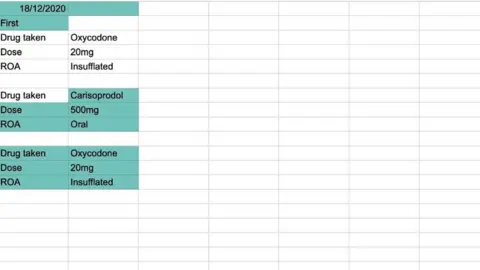'We had to investigate our autistic son's death'
 Family
Family The parents of an autistic teenager who died from an accidental overdose say they had to investigate his death themselves to find out what killed him.
Will Melbourne, 19, had mistakenly taken metonitazene, a strong synthetic opioid he bought on the dark web.
But his family had to wait three years for his inquest and say they then had to follow a digital "trail of breadcrumbs" to find out how he died.
Warrington Coroner's Service said it was not permitted to comment.
Sally and John Melbourne, from Cheshire, say the long wait for the inquest into their son's death put their lives and their grief on hold. At the pre-inquest hearing the family were told the court was short-staffed and had a backlog of 500 cases, which had built up over the pandemic.
They say they only discovered what drug their son had taken before he died, on 18 December 2020, after investigating his death with one of his friends - including examining photographs that showed the scene of Will's death.
They say a vital piece of evidence - the packet of blue pills found next to Will's body - was not tested until they raised it with the coroner's court a year after his death.
Their son's blood sample was destroyed after the company storing it went into administration, and by the time it came to the inquest, the family say they felt traumatised by the whole process.
"We thought the inquest system was there to give us answers," Mrs Melbourne says. "Instead, we felt blocked at every turn. It was outrageous that we had to take the investigation on ourselves."

The parents of an autistic teenager follow his trail of evidence to uncover how he died.

Self-medicating
Described by those who knew him as a "genius", Will had been hoping to study mathematics at Cambridge. He was funny, passionate, and loved his friends and family, his parents say.
He was also autistic and battled with crippling social anxiety. Diagnosed at the age of eight, his parents say he received little support from any services.
 Family
FamilyThey say the world could be extremely challenging for Will, and by the time he was in his mid-teens, his anxiety had morphed into severe depression.
"He just wanted an escape from the pain," his mother explains. "He was self-medicating with drugs."
According to the Autism Research Centre, at the University of Cambridge, autistic people across the UK are far more likely to use recreational drugs to self-medicate for their mental health symptoms due to an absence of specific support in the NHS.
"This wasn't someone who's just trying to get high to have a good time," Mrs Melbourne says. "It was an obsession with trying to make himself feel better."
 Family
FamilyIn just a few months, Will had been in and out of A&E nine times following suicide attempts and the police had been called more than 50 times.
The local authority, Cheshire East Council, had told the family their only option was to make their son homeless - and then they would find Will supported accommodation to help with his mental health issues.
At the time of his death, Will had been living in assisted accommodation for six months.
"It was like throwing out our sick child, but we felt we had no choice," his mother says. "We couldn't get the support he needed and every day something more dangerous would happen. We also had to protect our daughter, Alice."
 Family
FamilyBy now, Will was ordering drugs from the dark web.
On 18 December 2020, he received what he believed to be oxycodone - a highly addictive opioid which not only helps with pain relief, but can also reduce the symptoms of anxiety.
"He could get so anxious he would be scared to leave the building. He wasn't getting any mental health support and he was struggling to cope," Mrs Melbourne says. "His flat was in a complete state. We couldn't help because we weren't allowed in because of Covid regulations."
 Family
FamilyThe inquest heard that because Will was deemed to have capacity, Richmond Fellowship, the charity that ran his assisted accommodation, was unable to prevent him ordering drugs or help keep his flat in order.
On the day he died, Will had been planning to meet friends. His parents now know that the two blue pills he took, marked M30, were not oxycodone. They were metonitazene - a synthetic opioid hundreds of times stronger than morphine.
"The only reason we now know that is because we investigated," his father says, "and Will helped us with that".
Metonitazene is part of the family of nitazenes, synthetic opioids recently linked to dozens of deaths across the UK.
Careful log
Will had kept a careful log of everything he took, how he consumed it, and at what time he had taken it. It was this log that helped his parents understand what he thought he had ordered and how much he had taken.
With the help of Will's best friend, Matt Beton, they were able to guess Will's password and access his computer where they found these detailed tables and lists. 'We had to investigate our autistic son's death'
"He left his own breadcrumb trail," Matt explains. "I couldn't have pieced it all together - his parents couldn't have pieced it all together.
"But with collaboration between us, we were able to figure out exactly what happened."
 Matt Beton
Matt BetonThe inquest heard that the investigating team from Cheshire Police had spotted the drugs, "Googled" them, and decided they were oxycodone. Yet despite toxicology tests from Will's blood coming back negative for oxycodone, the blue pills were not tested.
Cheshire Police said it is not "common practice" to test all drugs found at the scene of sudden deaths.
They added that because Will's death was not suspicious, a standard post-mortem and toxicology report was requested by the coroner and no further tests were requested.
Coroner Victoria Davies agreed with the evidence gathered by Will's family, that the blue pills were metonitazene and that Will had bought them believing them to be oxycodone.
 Family
FamilyThe court heard the drug would have been so potent it would have caused respiratory depression - preventing Will's lungs from taking in enough oxygen - and he would have died within an hour.
The inquest verdict was death by misadventure.
Cheshire East Council said it supported the coroner's findings and it remains "committed to providing the highest standards of care" and will continue to "identify opportunities to improve services".
Richmond Fellowship, which ran the assisted accommodation in Macclesfield, said the "health, safety and wellbeing of the people we support have always been at the heart of everything we do" and that it would continue to review and improve its services.
"Our son is now part of a wider picture about synthetic opioids," Will's mother says. "Maybe if they had tested the drugs as a matter of course, the warning bells about this drug could have been sounded sooner."
If you, or someone you know, have been affected by mental health issues, please visit BBC Action Line to find information on organisations that can help.

Sign up for our morning newsletter and get BBC News in your inbox.

